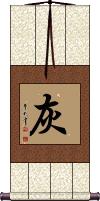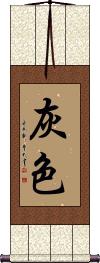Many custom options...
And formats...

Ash in Chinese / Japanese...
Buy an Ash calligraphy wall scroll here!
Personalize your custom “Ash” project by clicking the button next to your favorite “Ash” title below...
灰 is the Chinese, Japanese, and Korean word for ash or ashes.
This can also refer to dust, lime, or gray. When speaking of emotions in Chinese, it can refer to being discouraged or dejected.
In Japanese, this can be the surname, Hai.
Gray Color
灰色 is the Chinese, Japanese Kanji, and old Korean Hanja for the color gray.
This can also mean ash gray, grizzly, pessimistic, gloomy, dispirited, ambiguous (not black and white), and the alternate spelling grey.
Gray
Not the results for Ash that you were looking for?
Below are some entries from our dictionary that may match your Ash search...
| Characters If shown, 2nd row is Simp. Chinese |
Pronunciation Romanization |
Simple Dictionary Definition |
灰 see styles |
huī hui1 hui hai はい |
More info & calligraphy: Ashash; ashes; (surname) Hai Ash; lime; hot or fiery as ashes. |
こら see styles |
gora ゴラ |
{geol} kora layer; layer formed from volcanic ash on the southern part of the Satsuma Peninsula; (personal name) Gola |
灰色 see styles |
huī sè hui1 se4 hui se haiiro(p); kaishoku(ok) / hairo(p); kaishoku(ok) はいいろ(P); かいしょく(ok) |
More info & calligraphy: Gray Color(noun - becomes adjective with の) grey; gray; ashen |
アッシュ see styles |
ashu アッシュ |
More info & calligraphy: Ashe |
尉 see styles |
yù yu4 yü i い |
used in 尉遲|尉迟[Yu4 chi2] and 尉犁[Yu4 li2] (1) (archaism) (See 判官・はんがん・2) inspector (third highest of the four administrative ranks of the ritsuryō system); (2) {noh} (See 翁・おきな・1) old man; (3) white ash (of charcoal); (surname) I |
梣 see styles |
chén chen2 ch`en chen |
Chinese ash (Fraxinus chinensis) |
樆 see styles |
lí li2 li |
rowan or mountain ash (genus Sorbus) |
蒼 苍 see styles |
cāng cang1 ts`ang tsang souji / soji そうじ |
dark blue; deep green; ash-gray (n,adj-no,adj-na) (1) blue; (2) green; (3) (abbreviation) green light; (4) black (horse coat color); (prefix) (5) immature; unripe; young; (personal name) Souji Azure; the heavens; grey, old. |
冬瓜 see styles |
dōng guā dong1 gua1 tung kua tougan; touga / togan; toga とうがん; とうが |
wax gourd (Cucurbitaceae, Benincasa hispida); white gourd; white hairy melon; Chinese squash wax gourd (Benincasa hispida); ash gourd; white gourd; winter melon |
劫灰 see styles |
jié huī jie2 hui1 chieh hui kōkai |
kalpa-ash, the ashes after the fire kalpa of destruction. |
塵灰 see styles |
jinkai じんかい |
dust and ash |
大乘 see styles |
dà shèng da4 sheng4 ta sheng oonori おおのり |
Mahayana, the Great Vehicle; Buddhism based on the Mayahana sutras, as spread to Central Asia, China and beyond; also pr. [Da4 cheng2] (surname) Oonori Mahāyāna; also called 上乘; 妙乘; 勝乘; 無上乘; 無上上乘; 不惡乘; 無等乘, 無等等乘; 摩訶衍 The great yāna, wain, or conveyance, or the greater vehicle in comparison with the 小乘 Hīnayāna. It indicates universalism, or Salvation for all, for all are Buddha and will attain bodhi. It is the form of Buddhism prevalent in Tibet, Mongolia, China, Korea, Japan, and in other places in the Far East. It is also called Northern Buddhism. It is interpreted as 大教 the greater teaching as compared with 小教 the smaller, or inferior. Hīnayāna, which is undoubtedly nearer to the original teaching of the Buddha, is unfairly described as an endeavour to seek nirvana through an ash-covered body, an extinguished intellect, and solitariness; its followers are sravakas and pratyekabuddhas (i.e. those who are striving for their own deliverance through ascetic works). Mahāyāna, on the other hand, is described as seeking to find and extend all knowledge, and, in certain schools, to lead all to Buddhahood. It has a conception of an Eternal Buddha, or Buddhahood as Eternal (Adi-Buddha), but its especial doctrines are, inter alia, (a) the bodhisattvas 菩薩 , i.e. beings who deny themselves final Nirvana until, according to their vows, they have first saved all the living; (b) salvation by faith in, or invocation of the Buddhas or bodhisattvas; (c) Paradise as a nirvana of bliss in the company of Buddhas, bodhisattvas, saints, and believers. Hīnayāna is sometimes described as 自利 self-benefiting, and Mahāyāna as 自利利他 self-benefit for the benefit of others, unlimited altruism and pity being the theory of Mahāyāna. There is a further division into one-yana and three-yanas: the trīyāna may be śrāvaka, pratyeka-buddha, and bodhisattva, represented by a goat, deer, or bullock cart; the one-yāna is that represented by the Lotus School as the one doctrine of the Buddha, which had been variously taught by him according to the capacity of his hearers, v. 方便. Though Mahāyāna tendencies are seen in later forms of the older Buddhism, the foundation of Mahāyāna has been attributed to Nāgārjuna 龍樹. "The characteristics of this system are an excess of transcendental speculation tending to abstract nihilism, and the substitution of fanciful degrees of meditation and contemplation (v. Samādhi and Dhyāna) in place of the practical asceticism of the Hīnayāna school."[Eitel 68-9.] Two of its foundation books are the 起信論and the 妙法蓮華經 but a larnge numberof Mahāyāna sutras are ascribed to the Buddha。. |
山梨 see styles |
shān lí shan1 li2 shan li yamanashi やまなし |
rowan or mountain-ash (genus Sorbus) (1) Yamanashi (city, prefecture); (2) (kana only) wild nashi (Pyrus pyrifolia var. pyrifolia); wild Japanese pear; (place-name, surname) Yamanashi |
山椒 see styles |
sanshou; sansho; sanshou / sansho; sansho; sansho さんしょう; さんしょ; サンショウ |
(kana only) Japanese pepper (species of Sichuan pepper, Zanthoxylum piperitum); Japanese prickly ash |
梣樹 梣树 see styles |
chén shù chen2 shu4 ch`en shu chen shu |
Chinese ash (Fraxinus chinensis) |
灰人 see styles |
huī rén hui1 ren2 hui jen kaito かいと |
(given name) Kaito An image of ashes or lime made and worshipped seven times a day by a woman whose marriage is hindered by unpropitious circumstances. |
灰分 see styles |
kaibun かいぶん |
(1) ash; (2) (nutritional) mineral content |
灰匙 see styles |
haisaji はいさじ |
ash scoop (tea ceremony) |
灰器 see styles |
haiki はいき |
ash box (used in tea ceremony) |
灰沙 see styles |
huī shā hui1 sha1 hui sha kesha |
Ascetics who cover themselves with ashes, or burn their flesh. |
灰河 see styles |
huī hé hui1 he2 hui ho kega |
A river of lava or fire, reducing all to ashes. |
灰燼 灰烬 see styles |
huī jìn hui1 jin4 hui chin kaijin かいじん |
ashes ash; embers; complete destruction is burnt to ashes |
灰猫 see styles |
haineko はいねこ |
(1) gray cat; grey cat; (2) ash-covered cat |
灰白 see styles |
huī bái hui1 bai2 hui pai kaihaku かいはく |
ash-colored gray; grey; griseous |
灰篩 see styles |
haifurui はいふるい |
ash strainer |
灰釉 see styles |
haigusuri はいぐすり |
ash glaze (type of fundamental glaze used in ancient times made from the ashes of raw materials such as unhulled rice, straw, oak and pine) |
無灰 see styles |
mukai むかい |
(can be adjective with の) ashless; ash-free |
煙灰 烟灰 see styles |
yān huī yan1 hui1 yen hui |
cigarette ash |
秦皮 see styles |
toneriko とねりこ |
ash tree (Fraxinus mandshurica) |
純鹼 纯碱 see styles |
chún jiǎn chun2 jian3 ch`un chien chun chien |
sodium carbonate; soda ash; Na2CO3 |
Click here for more Ash results from our dictionary
The following table may be helpful for those studying Chinese or Japanese...
| Title | Characters | Romaji (Romanized Japanese) | Various forms of Romanized Chinese | |
| Ash | 灰 | hai | huī / hui1 / hui | |
| Gray Color | 灰色 | haiiro / hairo | huī sè / hui1 se4 / hui se / huise | |
| Gray | 灰 | kai | huī / hui1 / hui | |
Successful Chinese Character and Japanese Kanji calligraphy searches within the last few hours...





